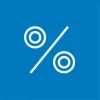The costs of investing have been driven downwards in recent years. The primary reason for this is that new fintech startups have emerged which offer free trading with no brokerage fees.
What are free online trading platforms?
Free online trading platforms and apps let you buy and sell stocks and other assets for free (or at a very low cost). The companies behind these solutions are sometimes referred to as free stock brokers, neobrokers, smartphone brokers or budget brokers.
The US online trading platform Robinhood was among the first to offer fee-free online trading via a mobile app. Many other startups around the world followed suit, and even established brokerage firms have caught onto the trend.
What free online trading platforms are there?
- BUX (Netherlands)
- eToro (Israel)
- Firstrade (US)
- Freetrade (UK)
- finanzen.net zero (formerly Gratisbroker, Germany)
- Justtrade (Germany)
- Revolut (UK)
- Robinhood (US)
- Scalable Capital (Germany)
- Smartbroker (Germany)
- Trade Republic (Germany)
- ...and many others.
Are free trading platforms completely free?
With some budget brokers, buying and selling stocks is completely free in the sense that you do not pay any brokerage fees. But depending on the platform’s business model, you may still pay account fees, custodial fees, or administrative fees. Stock exchange fees are normally charged to you, but these are generally very low.
The most important point to consider are the bid and ask rates for stocks and other assets. These spreads can differ widely between platforms. Unfavorable bid and ask rates can quickly become expensive. Delays in the fulfillment of limit orders may also occur, or limit orders may go unfilled. For these reasons it is important to use reputable free online trading platforms.
Are free online trading apps offered in Switzerland?
Most free online trading apps are not yet offered to residents of Switzerland. This is the case with many of the best-known international free online trading platforms.
The eToro trading platform is an exception to this rule. eToro is best known for its social trading functions. But while residents of Switzerland can trade with eToro, the platform has its limitations. Assets are held in street name. You cannot transfer your stocks to other brokers. You must buy, hold and sell them on eToro. If you do not make trades for 12 consecutive months, an inactivity fee of 10 US dollars is charged every consecutive month following that 12-month period in which you do not make any trades.
German free online trading platform Smartbroker is available to residents of Switzerland, but the signup process is somewhat tedious due to forms and documents required (FATCA-related forms, for example). The app is somewhat less user-friendly than the leading free online trading apps.
Are free trading apps secure?
Currently, free online trading platforms are only offered by foreign stock brokers. It is important to realize that not all of foreign-regulated stock brokers are reputable. It is also worth noting that the customer service of many foreign trading platforms is not comparable to that of Swiss stock brokers.
For these reasons, using foreign stock brokers and custodian banks is only recommended for experienced investors. Well-known free online trading platforms like Robinhood and Trade Republic are generally considered secure. But the business models of these platforms have been the subject of some controversy because they can potentially disadvantage customers.
How do free trading apps like Robinhood earn money if they do not charge brokerage fees?
Free trading is primarily a marketing instrument designed to lure as many customers as possible (the power of free). This principal is already well-established in Silicon Valley as a marketing ploy. Investment capital is used to finance free-to-use products in order to onboard as many users as possible.
Free online trading platforms use one or a combination of various business models. The most widely-used business models are listed here. Some of these are used as part of freemium models in which some basic services are provided free of charge, while fees are charged for “premium” services.
- Some platforms only offer certain stocks on a fee-free basis, while charging brokerage fees for other stocks (such as stocks from certain markets) or types of securities (like precious metals or cryptocurrencies).
- Some free online trading platforms offer additional paid app features, research and/or consultation (cross-selling and up-selling models).
- Account, administrative or custodial fees: Some platforms do not charge brokerage fees for trades, but do have a fixed monthly or annual fee.
- Inactivity fees: Some platforms charge a fee if you do not make any trades over a certain period of time.
- Leverage: Many platforms let you invest borrowed money in addition to your own money. Typically, you pay interest for these loans. Other costs may also apply to leverage and trading on margin.
- Bid-ask spreads: Brokers may add spreads to the actual market prices of stocks and other assets at your expense. This means you pay more and get less for your stocks than they are actually worth at a given time.
- Fees for holding cash in trading accounts (negative interest rates, for example).
- Payment for order flow: Platforms which use this business model forward orders to third parties like hedge funds and other market makers in exchange for financial compensation.
- Market reach: Platforms offered in large markets or internationally have very broad customer reach in relation to Swiss stock brokers. This allows for optimal scaling of business models. Platforms with large numbers of users can generate large revenues even if per-customer revenues are very low.
- Future price increases: Patterns visible in other sectors show that historically, service providers tend to raise prices as soon as they have gained a significant customer base.
What is payment for order flow?
Some free online trading platforms use a particularly controversial business model: payment for oder flow. They forward orders from their users to third-parties. Popular US platform Robinhood falls into this category, as it passes on its customers’ orders to market makers in exchange for financial compensation.
These market makers determine the prices which Robinhood customers get. Robinhood’s partner market makers include hedge funds and high-frequency traders. These operate in a largely non-transparent environment (refer to the glossary for information about dark pools).
This business model carries various conflicts of interest. Robinhood users which buy or sell stocks using market orders are at risk of paying more or getting paid less than they would if their orders were passed on directly to a stock exchange. In the case of limit orders, the payment for order flow model can result in orders being filled late or not at all. The reason for this is that the market makers which set the prices earn money on the spreads they add to market prices. If these are too small, the buy or sell order may not be filled even if bids at the limit price are available on the stock exchange.
Another problem is that hedge funds may themselves hold interests in certain stocks, as was highlighted by the Gamestop stock hike and similar phenomena. This Robinhood is dependent on a handful of hedge funds for a significant portion of its revenues.
What are fractional shares?
Many free trading apps like Robinhood, Trade Republic and Revolut give you the option of buying fractional shares. Instead of buying full shares, you can invest in fractions of shares. This is advantageous because you can participate in the performance of high-value stocks even if you cannot afford to buy full shares. This allows you to invest in a broad portfolio which can include expensive stocks, even if you have relatively little investment capital.
The disadvantage of fractional shares is that they cannot be transferred. Another disadvantage is that some platforms (like Robinhood) only allow market orders but not limit orders when you trade fractional shares, in which case you are completely at the mercy of market makers with regards to the price you get.
What are the possible advantages or free online trading platforms?
- The low costs are the biggest advantage. In the best case, you may pay little or nothing in the way of fees. Because the cost ratio is low, the threshold which stock prices have to cross before delivering returns is lower. This is especially relevant if you do not have large amounts of investment capital and cannot afford to open large investment positions for each stock in your portfolio (the cost ratio is typically lower for larger positions).
- User-friendly apps: Many new free trading platforms are primarily offered as mobile apps. These apps are often exceptionally user friendly. Finding, buying and selling stocks and other assets is generally very simple.
What are the possible disadvantages of free online trading platforms?
- Some free trading platforms (like Robinhood) forward orders to third-party firms. This business model is non-transparent and problematic.
- Some free trading platform give their users bid and ask prices which are less favorable than actual rates on stock exchanges. These spreads are a hidden cost which is hardly noticed by most users.
- You may pay more taxes on dividends, depending on where the broker is located and what kind of securities are used. Reclaiming foreign withholding taxes on stock dividends may be more difficult or even impossible.
- Many free trading platforms only offer access to a limited number of stock exchanges and you may not find all of the securities which you want to trade.
- Compared to established stock brokers, the features available on many free online trading platforms are rudimentary, making them unsuitable for more demanding investors. For example, they may only offer very basic order types and instructions.
- Some of the most popular free online trading apps are not available in Switzerland.
- Customer service and support is often inadequate.
- Consumer watchdogs believe that the simplicity of free online trading apps and the ease with which stocks can be bought and sold results in many small savers losing money or being lured into high-risk investments. The low cost of trading lends to impulse trading and makes investors more vulnerable to manipulation.
Which is the most popular free online trading app?
US free online trading app Robinhood is currently the most popular trading platform of this kind. But Robinhood is not available to investors in Switzerland. At this point, only stocks, ETFs and options listed on US exchanges can be traded for free. You pay stock exchange fees and government duties.
Robinhood was founded in 2013 and now has over 22 million users. That makes it the most successful free online trading app in the world at this time.
Robinhood earns its revenues through interest on leverage and through financial compensation received for forwarding user orders to third parties (like market makers and hedge funds).
Many well-known big tech companies – including Google – are also Robinhood stakeholders. The search-engine giant has long been on the lookout for business models which can help it gain a stake in the digitization of finance.
Why are Swiss stock brokers popular internationally?
In spite of the fact that Swiss stock brokers charge relatively high brokerage fees, demand for Swiss online trading accounts is on the rise. Switzerland’s allure as a politically and economically stable financial center continues to draw investors.
On the other hand, only a relatively small number of Swiss investors make use of cheaper international brokers for trading stocks. Security is a primary concern for investors.
Are there any Swiss free online trading platforms?
Swiss online trading platforms are among the more expensive platforms when compare internationally. Swiss stock brokers cite the high costs associated with regulatory requirements and running expenses in Switzerland as the reason for this. But unlike many foreign online trading platforms, Swiss stock brokers generally have full banking licenses and are subject to the same financial requirements and supervision as other Swiss banks.
Some Swiss stock brokers offer free demo accounts which simulate trading using virtual money but real market information. These are useful for testing platforms and learning the basics of trading, but they cannot be used for actual investing.
Some Swiss stock brokers occasionally run special promotions or introductory offers by which they offer free trades – but only for a limited period of time and/or up to a limited number of trades. Special promotions and introductory offers are shown in the interactive online trading comparison on moneyland.ch.
Update: Since mid-July 2022, the Swiss Flowbank offers free trades of Swiss stocks via the BX Swiss exchange. This means there are no brokerage fees, only stamp taxes. This shows that the trend is slowly arriving in Switzerland.
Will free trading become the norm in Switzerland?
It is not likely that free trading will be widely offered in Switzerland in the near future. Swiss brokerage fees have – on the whole – gotten lower in comparison to international averages in recent years. But Switzerland is relatively small market and running costs are relatively high.
The cost of trading stocks and other securities in Switzerland has only come down on a few occasions. In most cases, this was caused by the emergence of new stock brokers which used below-average fees to position themselves in the Swiss market.
It is possible that more multinational budget trading platforms will begin offering their services to Swiss investors in the future. If enough Swiss consumers adopt these platforms, Swiss banks will be put under pressure to adapt their prices in order to compete.
How high are the custodial and brokerage fees charged by Swiss stock brokers?
Some Swiss stock brokers like Cornèrtrader do not charge custodial fees. However, you may be charged inactivity fees if you do not make trades on a regular basis.
Brokerage fees apply in practically every case. These vary depending on the stock broker you use, the type of security you are trading, the stock exchange used, the number of securities being trade, and the value of the trade.
Be skeptical of marketing gags, like advertisements of 5-francs per trade brokerage fees. The advertised prices are generally the lowest possible brokerage fees you could pay with that broker, taking into account all of the factors listed above. Additional fees might also apply. A thorough online trading comparison based on your specific needs, like the interactive comparison on moneyland.ch, must account for all fees and charges.
More on this topic:
Compare Swiss stock brokers now
Custodial fees explained
Tips for stock trading
Order types offered by Swiss stock brokers compared











